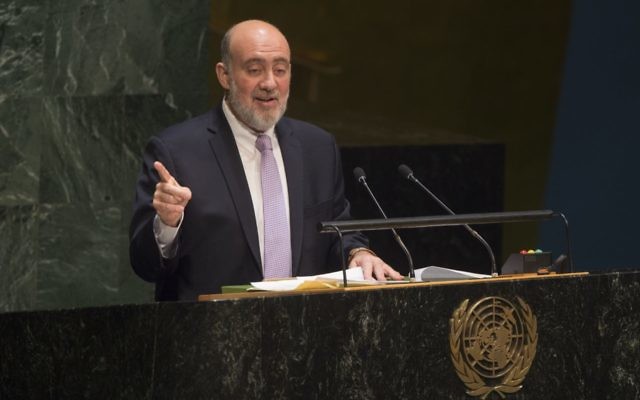UN anti-Semitism session welcomed
THE first-ever meeting of the United Nations General Assembly to deal specifically with the rising tide of anti-Semitism has been met with cautious optimism by local Jewish leaders.
However the consensus is that it will take more than mere discussions to adequately address the problem.
The informal meeting last Thursday saw speakers including US permanent representative to the UN Susan Power, French philosopher Bernard-Henri Lévy, German Minister of State for Europe at the Federal Foreign Office Michael Roth and even Saudi Arabian ambassador Abdullah al-Mouallimi condemn the rise in anti-Semitism worldwide.
Israeli ambassador to the UN Ron Prosor said violent anti-Semitism was “casting a shadow” over Europe and also singled out the UN itself as a party to blame.
“This summer, disguised as humanitarian concern, delegates have used this podium to commit anti-Semitism, accusing Israel of behaving like Nazis,” he said in reference to Operation Protective Edge.
The meeting culminated in the signing of a joint declaration by more than 40 countries to “rededicate themselves” to the determination to eradicate the conditions that gave rise to the Holocaust and to “endeavour to eliminate anti-Semitism in all forms”.
Arsen Ostrovsky, an Australian living and working in Israel as the director of research at The Israeli Jewish Congress, flew to New York to attend the session.
While he labelled it a historic initiative, he said the time has long passed to stop just talking about anti-Semitism.
“Mere words are not enough and great expressions of sympathy, while important, are just not sufficient. Today it is time for action,” he said.
“It was however most pleasing to see Australia’s representative to the United Nations call anti-Semitism ‘deplorable and unacceptable’, adding that it should be ‘unequivocally condemned by the international community and rejected by all nation States’.”
Locally, Executive Council of Australian Jewry president Robert Goot said the meeting was a welcome development, “although it would be preferable if the meeting were a formal one, concluding with a formal resolution, and meaningful action,” he said.
“We can only hope that Rabbi Yaacov Monsonego of Toulouse, France [who also spoke at the meeting], is right when he says that he expects that the meeting will result in meaningful government action against this scourge, and will not prove to be yet another instance of sincere but merely symbolic statements.”
He added: “The Australian government is to be applauded for joining with 36 other countries in calling for the meeting.”
B’nai B’rith Anti-Defamation Commission chairman Dvir Abramovich also welcomed the meeting and commended Australia’s role in sponsoring it.
“The tragedy in the kosher supermarket in Paris further underlined the urgent need for the UN to convene this session and to focus on the serious and troubling issue of Jewish hatred,” he said.
Australia/Israel & Jewish Affairs Council executive director Colin Rubenstein called it a “welcome and important first step” in the world body acknowledging that anti-Semitism has moved from the fringes to the mainstream and must be urgently tackled.
“It is of course stating the obvious that even amongst the countries that participated in the conference – and regrettably many did not – are paradoxically some of those that are home to the vilest anti-Semitism and wildest conspiracy theories, disseminated by government officials, in the media and education systems as entirely legitimate and rational forms of discourse, often in the guise of criticism of Israel,” he said.
“The key will be to see if their future actions are ameliorated by their positive words.”
GARETH NARUNSKY
Israel’s Ambassador to the UN Ron Prosor addressing last week’s session on anti-Semitism. Photo: UN Photo/Eskinder Debebe


comments